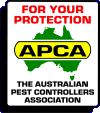Unfortunately, the AUSTRALIAN pest control industry has a mixed reputation ... good and bad. It is far too easy to start up a pest control business employing people to use the hazardous pesticides who do not have the training to provide a safe and effective service.
 |
"Happy Haphazard" pest sprays... done dirt cheap
Unrealistic price cutting and resultant inadequate servicing are common-place with some companies operating from a rented residence using a mobile phone number. Here today - gone tomorrow.
Such low pricing can be achieved by providing a sub-standard service using trainee operators and the cheaper old style more toxic pesticides - a hazard to themselves and the general public.
The modern technology products are far safer but much more expensive and require a higher level of skill to ensure an effective result.
|
In most cases, a serious termite infestation will require the use of some chemicals, in order to minimise the risk of severe timber damage to a building. However, there are modern products and technologies available to suit environmentally sensitive situations.
After a thorough inspection and detailed written report on the premises, your termite professional should recommend a range of termite control methods suited to your particular circumstances, with an emphasis on safety and effective protection of the premises.
|

|
PLEASE NOTE: home insurance does NOT cover termite damage to the timbers in a building. A chemical soil barrier treatment should provide an effective barrier against termites for over five years.
The most common consumer complaint is that the Company has NOT done the job properly "the termites are back causing major damage" and the Company has disappeared, leaving the home-owner with the problem.
|
| APCA Consumer Advice on Selecting a Pest Controller
|

 |
Extracts from APCA Bulletin on Selecting a Professional Pest Controller
Selecting a professional pest controller that will provide an appropriate "value for money" safe and effective service can be a daunting task. Your enquiries should focus on whether the business is a solid company in case a problem arises in the future, the level of expertise, insurance cover, any warranties applicable and the safety aspects employed.
|
 Obtain
several quotes and check out each of the companies. First
enquire as to how long the business has been established. Do they
have a good reputation in the market-place. Are they a member of a
recognised Pest Control Association? Obtain
several quotes and check out each of the companies. First
enquire as to how long the business has been established. Do they
have a good reputation in the market-place. Are they a member of a
recognised Pest Control Association?
 Ask
questions about termites and the different treatment options
the company employs, the chemicals used, their toxicity and safety
aspects. Compare notes on the methods of each company. Which company
seems the more professional? Ask
questions about termites and the different treatment options
the company employs, the chemicals used, their toxicity and safety
aspects. Compare notes on the methods of each company. Which company
seems the more professional?
 Make
sure the company carries professional indemnity and public liability
insurance for their termite control services and inspection
reports. Make
sure the company carries professional indemnity and public liability
insurance for their termite control services and inspection
reports.
 Be
present during the termite inspection. Study the general
presentation of the inspector, such as, was the inspector in company
uniform, with proper identification? Did he/she arrive in a tidy motor
vehicle and use quality equipment, including a moisture meter? Was
a thorough inspection carried out? Were you presented with informative
documentation regarding the inspection findings and treatment proposals?
Did he/she adequately explain the alternatives so you are confident
he/she knew his/her subject matter? Were there any other aspects that
may indicate professionalism or otherwise? Make notes and comparisons. Be
present during the termite inspection. Study the general
presentation of the inspector, such as, was the inspector in company
uniform, with proper identification? Did he/she arrive in a tidy motor
vehicle and use quality equipment, including a moisture meter? Was
a thorough inspection carried out? Were you presented with informative
documentation regarding the inspection findings and treatment proposals?
Did he/she adequately explain the alternatives so you are confident
he/she knew his/her subject matter? Were there any other aspects that
may indicate professionalism or otherwise? Make notes and comparisons.
 Enquire
as to the qualifications and experience of the termite inspector.
Does he/she have a current pest controller license (and not just a
trainee permit). You should cite his/her State
Govt issued pest controller license, noting name, number and
expiry date. Enquire
as to the qualifications and experience of the termite inspector.
Does he/she have a current pest controller license (and not just a
trainee permit). You should cite his/her State
Govt issued pest controller license, noting name, number and
expiry date.
 Enquire
as to whether the company uses employees or sub-contractors.
Be wary of companies with sub-contractors as problems often occur
in the market place where sub-contractors are obliged to pay for the
supply of chemical and other costs but do not assume responsibility
if the service proves to be inadequate at a later date. Enquire
as to whether the company uses employees or sub-contractors.
Be wary of companies with sub-contractors as problems often occur
in the market place where sub-contractors are obliged to pay for the
supply of chemical and other costs but do not assume responsibility
if the service proves to be inadequate at a later date.
 Ask
about any applicable back-up service period. For example,
a company may provide you with a twelve month "FREE service period"
for a chemical soil barrier treatment where the termite controller
is confident a complete barrier is in place around the entire foot-print
of the building. This annual service period may be extended annually
thereafter (at the customers option) provided necessary regular inspections
and other essential control measures are carried out as recommended. Ask
about any applicable back-up service period. For example,
a company may provide you with a twelve month "FREE service period"
for a chemical soil barrier treatment where the termite controller
is confident a complete barrier is in place around the entire foot-print
of the building. This annual service period may be extended annually
thereafter (at the customers option) provided necessary regular inspections
and other essential control measures are carried out as recommended.
 Be
wary of companies that offer a 10 or 20 year warranty as
this commits you for that period, so you have to obtain (pay for)
regular inspections and other work whether or not you want it. Such
a long term warranty offer is usually unrealistic and a sign of short-term
intentions. Be
wary of companies that offer a 10 or 20 year warranty as
this commits you for that period, so you have to obtain (pay for)
regular inspections and other work whether or not you want it. Such
a long term warranty offer is usually unrealistic and a sign of short-term
intentions. |
|
Australian Standard 3660 - Termite Protection of Buildings |

 Australian
Standard 3660 has a legal status in that the relevant State
Govt Pesticide legislation requires the chemicals used for soil barriers
against termites shall be used in accordance with the pesticide label,
the wording of which is approved by the Federal Govt National Registration
Authority on chemicals. The pesticide label in turn requires the chemical
be applied in accordance with Australian Standard 3660. Australian
Standard 3660 has a legal status in that the relevant State
Govt Pesticide legislation requires the chemicals used for soil barriers
against termites shall be used in accordance with the pesticide label,
the wording of which is approved by the Federal Govt National Registration
Authority on chemicals. The pesticide label in turn requires the chemical
be applied in accordance with Australian Standard 3660.
 A.S.3660.2
- 2000, Termite Management - In and around Existing Buildings and
Structures provides guidelines on procedures for the detection,
treatment and minimisation of termite activity in and around existing
buildings and structures, including (1) chemical soil barrier treatments
(2) termite nest location techniques (3) non-chemical recommendations,
and (4) the inspection procedures, written reporting requirements
and recommended frequency of follow-up inspections. A.S.3660.2
- 2000, Termite Management - In and around Existing Buildings and
Structures provides guidelines on procedures for the detection,
treatment and minimisation of termite activity in and around existing
buildings and structures, including (1) chemical soil barrier treatments
(2) termite nest location techniques (3) non-chemical recommendations,
and (4) the inspection procedures, written reporting requirements
and recommended frequency of follow-up inspections.
 A.S.
3660.1 - 2000, Termite Management - New Building Work, sets
performance requirements regarding physical and chemical termite barriers
that can be installed in and around a building, during construction
of new buildings and ground level extensions and renovations. This
standard is referenced in the Building Code of Australia to make it's
requirements mandatory. A.S.
3660.1 - 2000, Termite Management - New Building Work, sets
performance requirements regarding physical and chemical termite barriers
that can be installed in and around a building, during construction
of new buildings and ground level extensions and renovations. This
standard is referenced in the Building Code of Australia to make it's
requirements mandatory.
 Copies
of the Australian Standard 3660 are available from Standards Australia
- telephone 1300 654 646. Copies
of the Australian Standard 3660 are available from Standards Australia
- telephone 1300 654 646. |
| Books & References on Professional Pest Control
|

|
Australian Publications
Australian Standard 3660 Protection of Buildings from Subterranean Termites - Prevention, Detection and Treatment of Infestation. Available direct from Standards Australia - telephone 1 300 654 646.
Australian Standard 4349 - Part 3: Timber Pest Inspections. Available from Standards Australia - telephone 1 300 654 646.
Building Out Termites, An Australian Manual for Environmentally Responsible Control by Robert Verkerk 1990. Available from the Co-Op Bookshop.
Termites and other Commom Timber Pests by Phil Hadlington. This is an excellent book on Termites and Termite Control. Available from the Co-Op Bookshop.
Urban Pest Control in Australia by Phil Hadlington & John Gerozisis. The Australian industry text book for more than 30 years. Available from the Co-Op Bookshop.
Wood-Destroying Insects, Wood Borers and Termites by J.W. Creffield. An excellent publication from CSIRO Publishing - telephone Melbourne 9662 7666.
USA Publications
Handbook on Pest Control by Arnold Mallis. The leading industry text book in the United States of America since 1945. The most detailed textbook in the world on urban pest control. Current edition exceeds 1,400 pages.
Termites - Biology and Pest Management by M.J. Pearce. An authoritative text on termites, their biology and termite control methods world-wide.
Trueman's Scientific Guide to Pest Control Operations. A Purdue University publication, Indiana, USA. A comprehensive text of more than 500 pages.
|
|
Professional Pest Control - for a Safer Pest Free Environment
|

CLICK ON YOUR STATE - TO FIND A LOCAL PEST CONTROLLER
NSW
 ACT ACT
 VIC VIC
 QLD QLD
 SA SA
 NT NT
 WA WA
|



